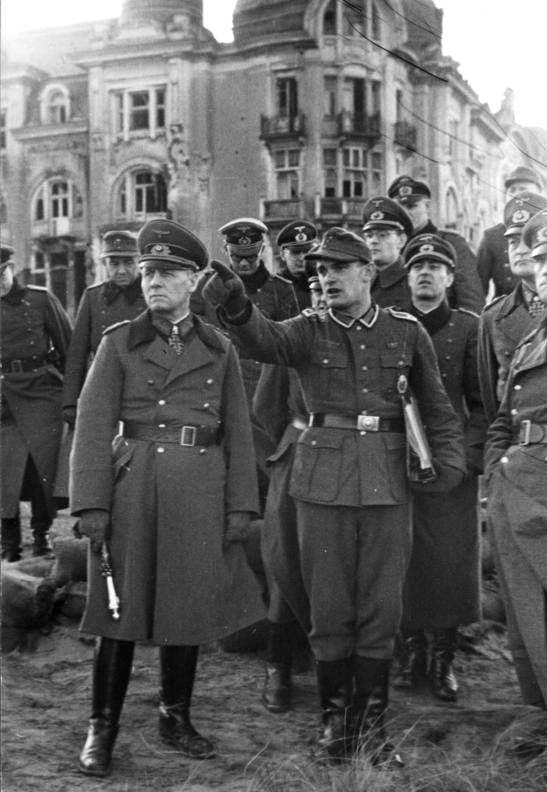 |
| Erwin Rommel |
Born into a middle-class family with no military background in 1891, Erwin Rommel went on to become one of the most decorated and senior generals in the German army during World War II. He is most famous for commanding the German Afrika Korps from 1941 to 1943. He proved such a competent commander during this period that the British nicknamed him the "Desert Fox."
Rommel first distinguished himself as a leader in a number of combat missions during World War I in France, Italy, and Romania. For his exceptional military prowess he was awarded two Iron Crosses and became the youngest recipient of a Pour le Merite, Germany's highest military honor. Following the war he served as an instructor at the Dresden Infantry School from 1929 to 1933 and the Potsdam War Academy from 1935 to 1938.
He also wrote a well-received textbook on military theory, Infantry Tactics, in 1937. Infantry Tactics caught the attention of Adolf Hitler. Rommel was subsequently promoted to colonel and given command of the Hitler Youth paramilitary force and later Hitler's bodyguard battalion in 1939–40. By now a major general, Rommel took command in February 1940 of Germany's 7th Panzer Division and led his new unit to war against France on May 10.
  |
Despite having no previous experience in tank warfare, Rommel displayed an uncanny instinct for coordinating large and fast-moving armored formations. He outperformed his more experienced colleagues in the blitzkrieg assaults. In a six-week campaign, Rommel's unit captured over 450 tanks and over 100,000 Allied prisoners.
In an effort to relieve the beleaguered Italian units fighting in North Africa, Hitler promoted Rommel once again and awarded him a new command in January 1941. Rommel landed in Libya with the two divisions that would form the foundation of the Afrika Corps (Korps).
 |
| Erwin Rommel, The Desert Fox, Commander of German forces in North Africa 1942. |
Violating his orders from Wehrmacht high command to consolidate his new units, he attacked the British forces in North Africa in March and caught them off balance, which allowed him to retake all of Cyrenaica except Tobruk. Promoted to full general in the summer of 1941, Rommel and his Panzer Group Africa held off British counter-attacks until he was eventually forced to withdraw in November.
After receiving new supplies and reinforcements, he launched a series of offensives against the British, concluding in the Gazala battles through which he regained all of the lost ground and captured Tobruk. He was promoted once more to field marshal on June 22, 1942, in recognition of his success.
Rommel's panzer group was defeated by the British at the first Battle of El Alamein in July, defeated again by British general Bernard Montgomery at Alam Halfa in September, and crushed at the second Battle of El Alamein in October. Facing competent and far better supplied Allied troops, Rommel's forces were hampered by fuel shortages and his own debilitating medical problems.
 |
| Erwin Rommel in Raversijde, Belgium. December 1943 |
Despite his achieving a notable victory over the U.S. 2nd Army Corps at the Battle of the Kasserine Pass in February 1943, Rommel's campaign in Africa was ultimately a failure. Against Hitler's orders he organized an orderly withdrawal from North Africa. He flew to Germany on extended sick leave, leaving many of his subordinates to be captured by the Allies.
Following the Allied victory in North Africa, Rommel was appointed commander in chief of German Army Group B in August 1943 and tasked with planning operations in northern Italy. When Rommel failed to defend Sicily or the Italian mainland from Allied invasion, Hitler ordered him to France in November 1943 to organize the defense of that country against further Allied invasion.
There he launched a massive construction effort to strengthen the Atlantic wall, particularly with his own innovative design of beach obstacles nicknamed "Rommel's asparagus." In addition, he ordered that thousands of tank traps and other obstacles be set up on beaches and throughout the countryside and that millions of mines be laid.
 |
| Erwin Rommel with his troops |
Rommel disagreed with the strategy of his superior, General Rundstedt, for defending France. Rundstedt believed that a large proportion of the German army should be held in reserve to provide a flexible means of reinforcing front line units and plugging gaps opened by the Allies, while Rommel argued that the German tank units should be deployed right at the beaches to repel the Allied invasion forces immediately. The former won out, but following the Allied invasion of Normandy on D-day, both struggled in vain to stop the Allied advance across France toward Germany.
Rommel was severely wounded on July 17, 1944, when his staff car was strafed by an RAF fighter. He was also implicated in a failed assassination attempt against Hitler on July 20. The investigators discovered numerous connections between Rommel and the conspiracy, including the deep involvement of many of his closest aides. He was offered a choice of poison or a lengthy show trial and a promise of reprisals against his family. Predictably, he took the former course of action on October 14, 1944.
 |
| The Funeral Of Erwin Rommel |